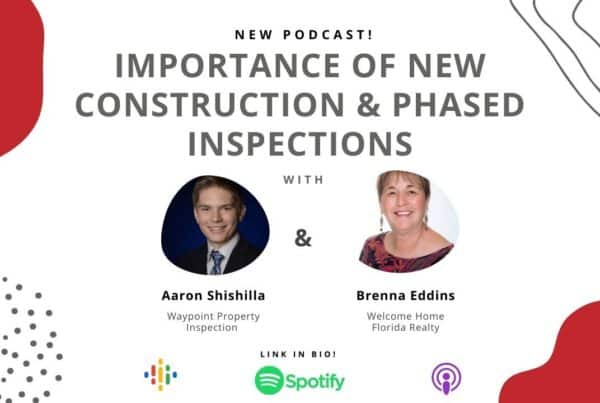
Homeowner’s Associations (HOA’s) and Community Development Districts (CDD’s) carry a lot of confusion in the home buying arena. Many Realtors are looking to explain the pros and cons of both to their clients in hopes that they make an educated decision.
Waypoint Real Talk is joined today by Realtor Crystal Brady who shares her expertise into HOA’s and CDD’s so, you can make an informed decision.
Listen to the Full Podcast
[powerpress]Let’s talk about the differences between an HOA, deed restrictions, CDD fees, and some pros/cons of having these fees vs. purchasing a home in a neighborhood without them.
What Is A Deed Restriction?
A deed restriction, also called restrictive covenants, limits what you can do with the real estate. They are outlined in the real estate deed.
These restrictions are typically put in place by the land developer and can have additional restrictions besides just what the county/city regulates.
An example of a deed restriction is being allowed only 3 dogs per household, or only one family home per lot.
However, deed restrictions can be difficult to enforce since there typically is not a governing body like an HOA.
What is an HOA Fee?
Homeowner’s associations are governing bodies that enforce deed restrictions.
Homeowners pay HOA fees which empower the governing body to enforce the rules of the neighborhood.
Typically, HOA’s are responsible for maintaining the grounds, amenities, and common areas. Also, in most cases, HOA’s are ran by property management companies (this is not always the case).
What is the Average Cost of an HOA?
HOA costs can really vary depending on the amenities, common grounds, and exterior maintenance the association is responsible for.
To illustrate, some HOA’s might include water in their HOA fee and have a pool, clubhouse, etc. On the other hand, another HOA might only include exterior mowing and vegetation maintenance.
Costs of HOA’s usually range from $200/year to $1,500/year.
Before signing a contract you should request to read the HOA documents which comes in an HOA disclosure. In the HOA disclosure you can see how much money the HOA has and the rules of the community.
Advantages of Having an HOA
While there are negatives of having enforced rules, there are many benefits that homebuyers may not think about.
Here are the pros of having an HOA:
- Deed restrictions and community rules are enforced.
- ALL homes in the neighborhood are well maintained.
- Exterior changes to the home must be approved by HOA.
- Amenities (not always, but often there are amenities).
- Preserves neighborhood property values.
- Can promote more community relations.
- You don’t have to confront your neighbors over issues with their home’s appearance.
To most home owners, the best advantages are preserving or increasing property values by having a well maintained neighborhood, amenities, and not having to confront your neighbors.
Disadvantages of Having an HOA
As mentioned, there are disadvantages. Let’s take a look.
- You must follow the rules.
- You do not have freedom to do everything you may want to do with your home.
- Additional cost per month.
- No community management- only the county or city building code enforcement.
Are HOA’s right for you?
It is important to consider your lifestyle when deciding if an HOA is for you. Do you have a boat that you want to keep on site? Do you have large vehicles you need to park at your home? Do you want the freedom to paint your house bright pink?
Comparatively, do you not want to worry about exterior maintenance? Do you want to better preserve the price of your home?
Popularity of HOA’s
Homeowner’s associations are becoming more popular in the United States, as large builders create communities with HOA’s.
Therefore, it might be more difficult for homebuyers to find a non-HOA neighborhood without traveling farther away from the heart of a city.
What is a CDD Fee?
CDD, stands for Community Development District and is a municipal bond.
When the community is built, the builder takes out a bond with the governing body in order to construct the development. This is typically because the communities are very large and require a lot of funds.
Once the community is built, the builder transfers bond payments of the land development to the homeowners, which is known as the CDD Fee.
The CDD fee pays for things like: roads, parks, playgrounds, schools, and more.
Moreover, the CDD fee is typically paid off 25-30 years after the community is developed, however, there will most likely always be an operations and maintenance portion of the CDD fee that never falls off.
What is the Average Cost of a CDD Fee?
Cost ranges of CDD neighborhoods can be from $800 to $2,400 per year, however, they are averaging about $1,800.
Homebuyers should understand that the CDD Fee can cost an extra $100-$200/month in their total mortgage payment.
Advantages of CDD‘s
Community Development Districts have many key advantages:
- Usually large, master-planned communities with amenities.
- Great schools.
- Good resale value of homes.
Popularity of Community Development Districts
As with HOA’s, CDD’s are becoming more popular in the United States due to their well maintained homes and awesome neighborhoods.
Concluding
A lot of buyers suggest to Realtors they do not want HOA’s or deed restrictions but they sometimes don’t realize what that means. It’s important to understand what each of these things means so you can decide what is right for you.
Thank you again to Crystal Brady for joining us on the podcast and helping write this blog!
If you have additional questions be sure to comment below!



